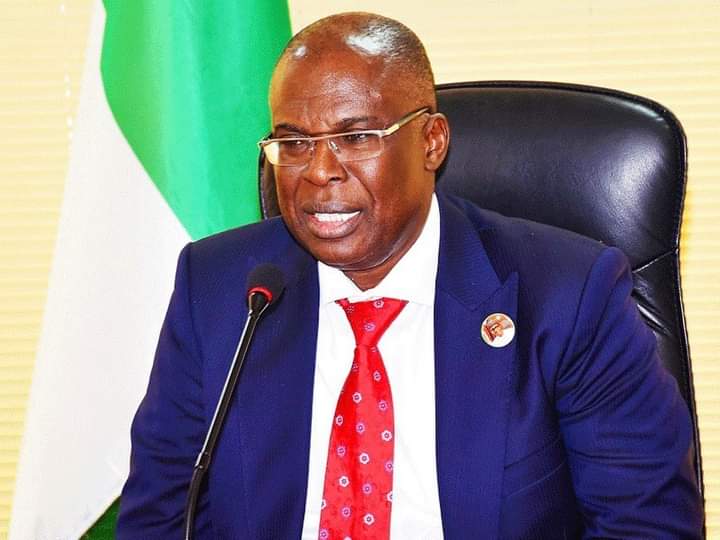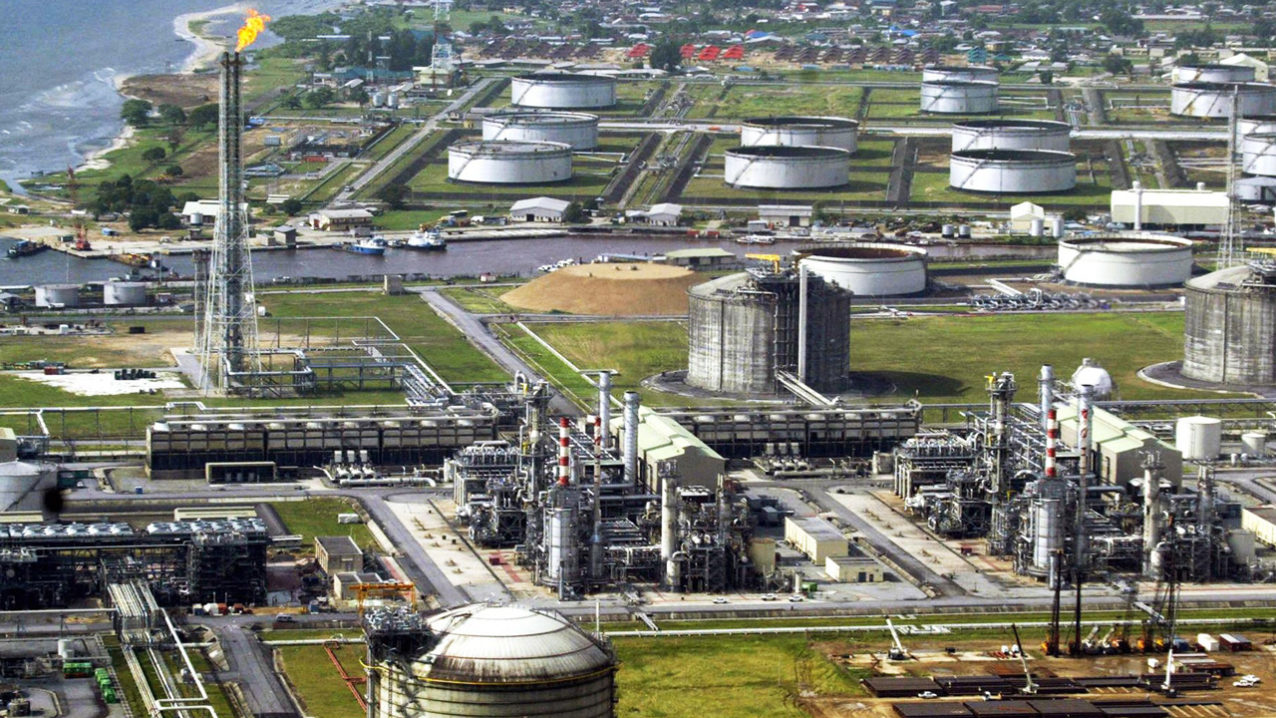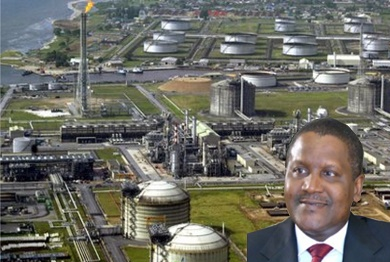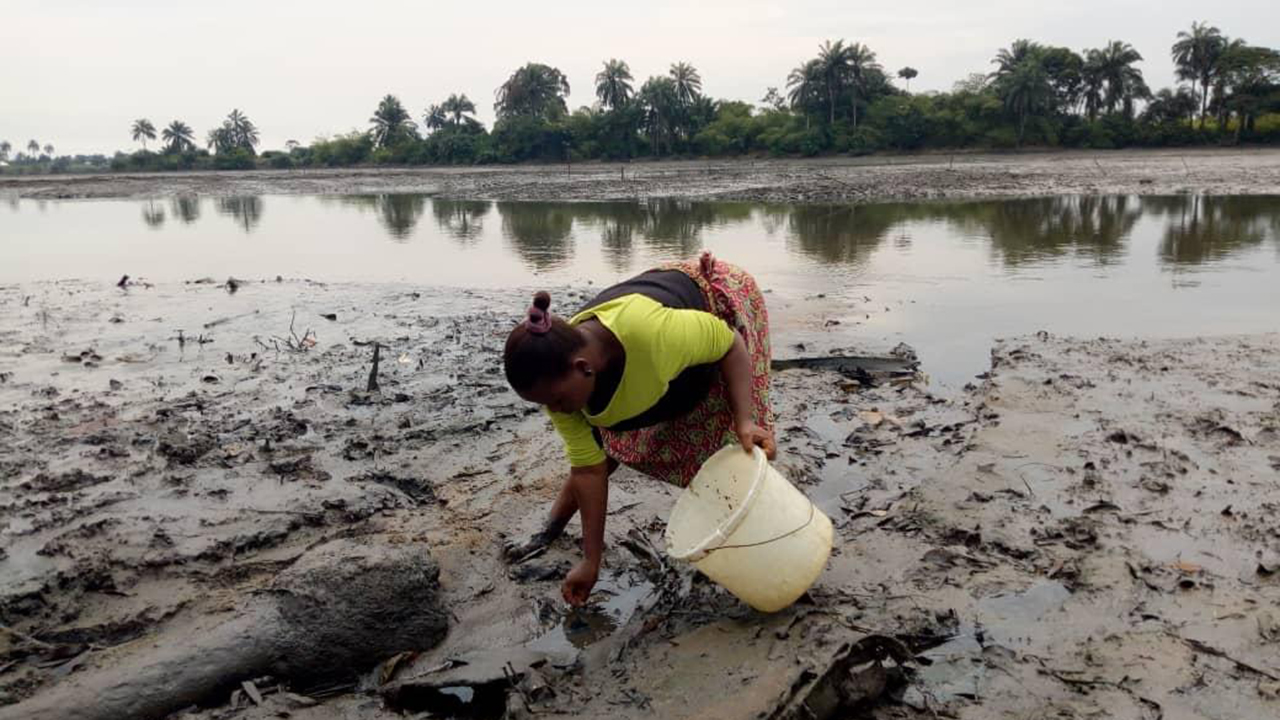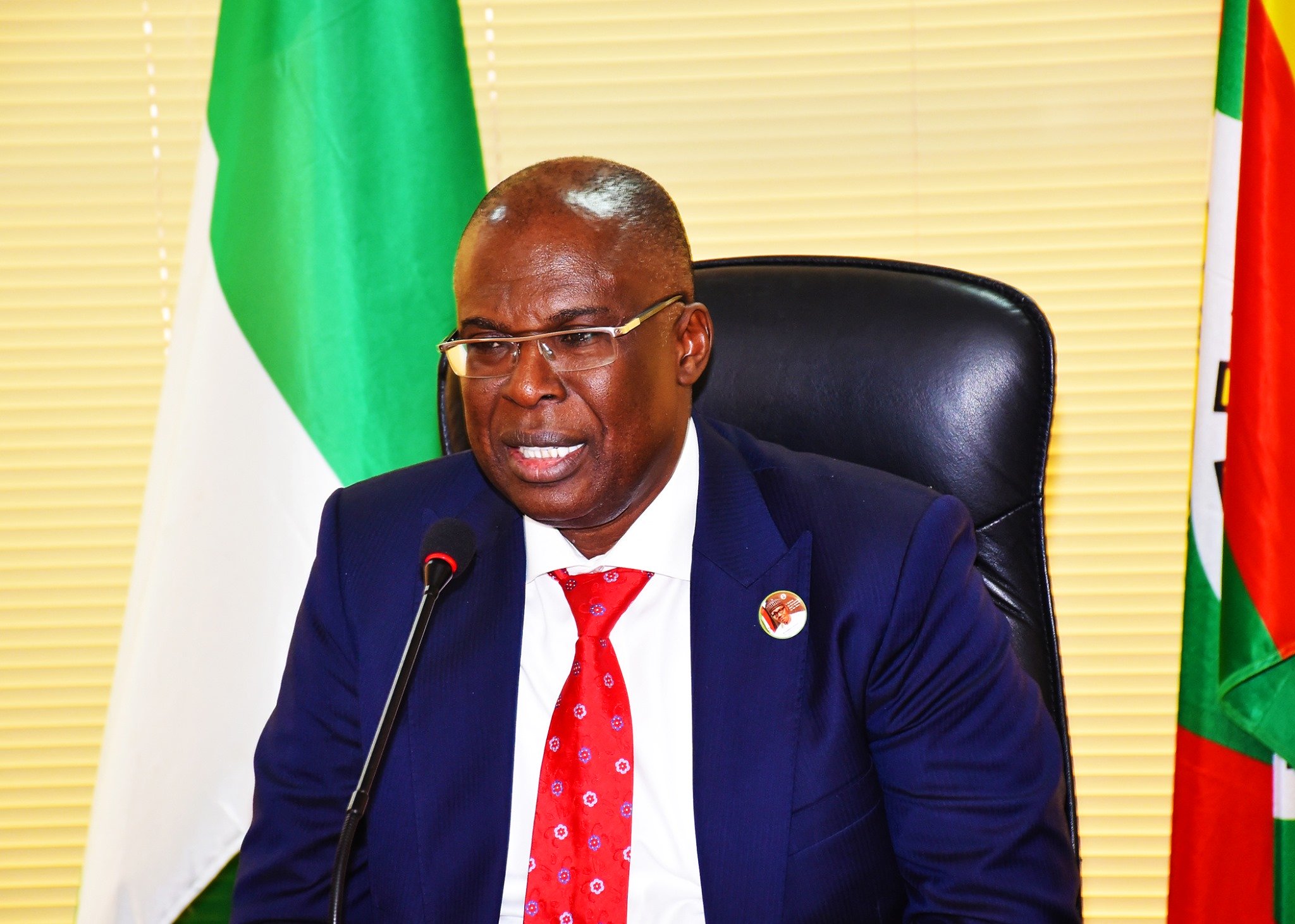…change from a tribesman to a statesman of character – Obasanjo tells Clark
…I reject your offensive words that I am inconsistent, hypocritical – Obasanjo to Clark
… Obasanjo insists he is nobody’s lackey
Apparently peeved by an open letter written by frontline Niger Delta leader, Chief EK Clark, former President Olusegun Obasanjo has maintained his position that in principle location of mineral resources in any part of Nigeria is valid.
TheNewsGuru.com (TNG) reports Obasanjo’s reaction to Chief Clark’s letter has sparked an open confrontation between both men.
TNG recalls that Chief Clark had in an open lambasted Obasanjo for displaying hatred towards Niger Deltans but Obasanjo in his reaction backing his position with constitutional clauses says he has no hatred for Niger Deltans but he simply stated the obvious.
Read his full letter below:
MY RESPONSE TO THE OPEN LETTER BY CHIEF (DR.) E. K. CLARK
Your letter titled “My Disappointment Over Unprovoked Outburst Against The People of the Niger Delta Region” came to my attention on my return from the Horn of Africa on Christmas eve. After very careful and close study of your letter, I decided to respond to your letter also openly for general education of all and to clear some misconception and misperception on your part.
First, my visit to you on the evening of Monday, December 13, 2021, was both a condolence and get-well-quick visit to you that had nothing to do with Bishop Sunday Onuoha meeting which I attended the following day. You should remember that I did not discuss in particular the meeting of the Committee for Goodness of Nigeria, CGN, that was coming the following day except to ask if the papers had been received by you. The brief touch on the state of the nation is the normal discussion on the situation which you rightly described as “continues to drift to very disturbing levels” that evening. Otunba Oyewole Fasawe, who was with me to your house and to all the four people I visited that night, can testify. You were one of the four people I visited. I would have. expected my social visit to be excluded from your vituperation on other matters. However, you deserved the visit and that was it.
For me, personally, I have never shown any anger or distraught with Niger Delta Region nor with any part or Region of Nigeria. Rather, I have always picked points on leadership performance or policies and I will continue to do so. Even when a particular part of Nigeria decided not to vote for me and their leaders told me that in clear terms, I showed understanding and not anger or distraught and disabused their minds on what I believed they got wrong. And in subsequent elections, they voted for me. My records before, during and after the civil war in Niger Delta Region was without blemish and it was all goodwill to all the people of Nigeria and especially the people of the Niger Delta Region which was my theatre of operation during the Nigerian civil war.
I could not have mentioned to you any grievances against the Niger Delta Region during my social visit because there was never anyone and there cannot be anyone. But if you take my holding a constitutional position on federalism and reiterating the position of our past Constitution – 1963 Constitution as I understand it as anger or grievance against the Niger Delta Region or Niger Delta people, that will be a very wrong position to take because until I can be legally and constitutionally persuaded otherwise, I will continue to hold my ground. And it is not a matter of emotion or threat or name-calling which do not throw light on the issue or walkout which does not strengthen any argument or debate.
What you call outburst is my own way of calling or attracting attention. I raise my voice or stamp the desk such that those who are sleeping would have to wake up to listen to me. Even in bilateral discussion, I consciously tap the other person to ensure that I am attracting his or her attention. I have had experience that it was when the person I was talking to started snoring that I realised he was not listening to me. But if raising my voice, stamping the desk or tapping is unpleasant to anyone, I tender unreserved apology. If I interjected to either complete a statement or to correct a statement being made that I believe was not the true situation, I have no apology for that. Truth must be stated and upheld no matter how bitter it may be.
Chief Clark, you are right to say that we have known ourselves since we were both in General Gowon’s administration in 1975. The good thing and maybe the bad one as well is that you haven’t changed much, if at all, since those days and I haven’t changed much either. You stated and displayed what you are characteristically known and noted for – Urhobo or Ijaw; and what I am characteristically known and noted for. Let me proceed with the most basic constitutional fact that you cannot have two sovereign entities within a State which is what your position of Niger Delta ownership claim of the crude oil found in that location amounts to.
All those who purchase crude oil from Nigeria enter into contractual relationship with Nigeria not with the Niger Delta. The territory of Nigeria is indivisible inclusive of the resources found therein. No territory in Nigeria including the minerals found therein belongs to the area of location and this remains so until the federation is dissolved.
This is the position of the Nigerian Constitution and international law. If there is a threat of violence to any part of Nigeria today including the Niger Delta it is the Nigerian military backed by any other machinery that can be procured or established at the Federal level that will respond to any such threat. In principle and practice, the position I have taken on the location of mineral resources in any part of Nigeria is the legal and constitutional position.
May I also recall the adjunct position I proposed that equity and justice demand that those domiciled in these locations are entitled to more of the material benefits accruing from the crude oil or other minerals. At the end of the day, it may transpire that our linguistic differences on this matter are no more than semantics. And we stand on the same logic with respect to the criminal mining of gold deposits in Zamfara State today or any other State in Nigeria or any other part of Nigeria.
Since you have selected the 1963 Constitution as your ideal guide, I will now quote the relevant Section 140 for the Nigerian public to arrive at a more informed and balanced understanding of our discourse: “The 1963 Constitution Section 140, titled “Mining Royalties and Rents”, stated thus: “(1) There shall be paid by the Federation to each Region a sum equal to fifty per cent of (a) the proceeds of any ROYALTY received by the Federation in respect of any minerals extracted in that Region; and (b) any mining RENTS derived by the Federation during that year from within that Region”.
My dear Chief, where in this constitutional provision is it said or implied that minerals located in any part of Nigeria belongs to that location? For emphasis and to further buttress the point, the provision is even in the exclusive list – exclusively reserved to the Federal Government!
You made the unnecessary reference to the appointment of Engr. Funsho Kupolokun as the Managing Director of the Nigerian National Petroleum Corporation, NNPC, but you conveniently forgot that before Kupolokun, there was Gaius Obaseki and Kupolokun served under Dr. Edmund Daukoru, who was Minister of State for Petroleum.
I would be the last person to celebrate the civil war (a tragedy of enormous proportions). Needless to say that the war was fought in order to maintain and secure the territorial integrity of Nigeria to which the Niger Delta is integral. I leave you to second-guess what would have become the fate of the Southern minorities and your ownership claims of the crude oil located in your backyard in the event of a contrary outcome. How do we pay homage to the memory of those who gave their lives to ensure the successful outcome of the civil war including the millions who perished on either side of the war?
This is certainly not the best of times for Nigeria and I understand and empathise with your frustrations but we must be guarded and measured in the expressions of such frustrations lest we throw away the baby with the dirty birth water.
In para 13 of your letter, you made reference to the issue of asset sharing between Midwest Region and Western Region in the days of General Adeyinka Adebayo and General Samuel Ogbemudia to which you are an eyewitness, observer or participant. I would not hold brief for either of the two military men or for the two dissolved Regions; but if this will feature in your consideration today, I really wonder where you are getting to. There may be more than meets the eye.
In para 15 of your letter, you tried to compare my Ota Farm with minerals under the soil which are exclusive to the Nigerian Authority as I have earlier shown. But even here, these are issues that must be explained that you wittingly or unwittingly skipped. I have a State Certificate of Occupancy, C of O, for my farmland and if any mineral is found under the ground on my farm, Federal Government will ask the State Government to revoke my C of O for overriding public interest. I could claim for development already carried out on my farmland but the Federal Government would issue licence to any company that had been allocated the right to mine the mineral. It would not matter what I grow on my farm and what development I have carried out. Compensation I could get based on assessed development that I had carried out on the farmland.
The Constitution that affects Niger Delta Region affects Zamfara State where gold is found and if anybody at the Federal level has remised in implementing the Constitution, then that is a different matter. The gold in llesha, Osun State, and the lead in Ebonyi State, all come under the same Law and Constitution. There is no part of Nigeria whose interest is not dear to my heart. And stating in your letter that it is only the interest of the North I continuously hold dear to my heart is that type of buka gossip that, knowing you as I do since 1975, I am not surprised that you echoed.
I have always stood for equity and justice in our Federation and, for me, tribe has to be suppressed for the state to emerge. And until the state emerges, Nigeria will not make the desired progress as tribesmen will always sacrifice state for tribe. This has always been my position and it will remain my position until I breathe my last.
There are many important points that you easily or conveniently left out in your letter. When Tin, Columbite in Jos Plateau and Zinc in Abakaliki and Coal in Enugu were discovered in the early 1900s, the ownership was vested in the Colonial Government. Mitigating the hazards suffered by people in any mineral-producing area is legitimate and must be differentiated from the issue of ownership. The mitigation process must go for oil and gas, lead, gold, limestone for cement, etc.
What developed Nigerian Regions in the colonial days and early post independence days were cocoa and rubber in the West, groundnut and cotton in the North and oil palm in the East.
Your paras 18-23 are tissues of concoctions and outright distortions and lies which may be due to loss of memory on your part or misrepresentation. Let me illustrate with few examples. On resumption of office as President of Nigeria in 1999, the first meeting I held out of Abuja was a meeting on the Niger Delta Region. Without being prompted, I decided the 13% derivation that the new Constitution granted to oil-producing areas should be paid. If you have evidence of a legal action that forced me to implement it, please produce for me to see or publish it. At the meeting of December 14, 2021 although the recommendation was to go from 13% to 17% to oil -producing areas, Dr. Igali made the case for 18% and we as CGN went up to not less than 18%. Niger Delta Development Commission, NDDC, bill was my initiative for contribution to be made by State Governments, oil companies and Federal Government. The States lobbied the National Assembly to exclude them. They were excluded and what was passed became the law eventually and I implemented it. You seemed to know little to nothing on LNG generally including efforts made to turn Bonny LNG from three trains to seven trains and surely you are not updated on Brass LNG and I will plead with you to be better admitted on it all.
Let me now separate Global Peace Foundation meeting of December 13, 2021 at the instance of Bishop Onuoha and where I participated from the second meeting of CGN which followed on December 14, 2021. We believe that the Conclusion and the Report of the meeting of December 14, 2021 hold the best position for realistic and pragmatic action for taking the country forward as possible actionable amendment to the Constitution before 2023 elections. Every Nigerian has rights under the Constitution. And no one should exercise his right against the right of another Nigerian. Our Report was only recommendations to those who can take action for implementation.
If at a meeting, singly or collectively with others, you will take action to negate the outcome of another meeting of national interest and importance based on extraneous outcome on issues emanating from another meeting not directly connected with the original first meeting, then how much can anybody take you seriously as a democrat, that smirks of a dictatorship to me? Some of the languages you have deployed to describe me in your letter are offensive, uncouth and I totally and completely rejected them. I am not inconsistent, hypocritical, unstatesman and nor am I anybody’s lackey. You use your own yardstick to judge others. I fear God and I respect those who respect themselves and I hope it is about time you change from a tribesman to a statesman of character. That is what Nigeria and indeed the Region you profess to love demand of you at this stage. I believe one lesson that we all must appreciate that we have all learned in the last sixty-one years of our independence is that we all need to be civil to ourselves and occasionally put ourselves in the position of others. Bad language does not show prudence, wisdom and maturity. I hope you will think and adjust. Negotiation achieves better results than dictation. I believe that we should be reformists rather than being pedantic with leave-it or take-it attitude. Together, I also believe Nigeria can be fixed and mended for the benefit of today and tomorrow on the basis of give and take. If we all demand what we consider as our rights without yielding and with unbending stature, we will be wrong and record failure at the end of the day. Reform is a continuous exercise but relatively slow in achieving results. Revolution for sea-change may rarely happen and then we may continue to languish in frustration and regret with dire judgement of posterity.
I wish you well and may the Year 2022 be a great year for you personally and for our country, Nigeria.
Yours in service of Nigeria
OLUSEGUN OBASANJO
December 28, 2021

